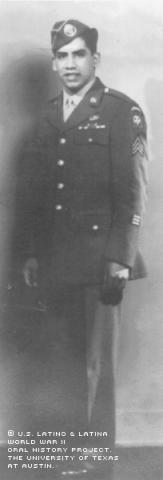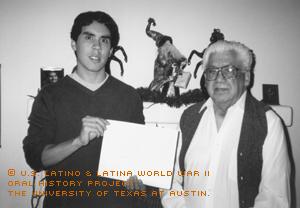

By Israel Saenz
Growing up in Utah, Raymon Elizondo grew up having to scrap: he struggled to get as much schooling as he could, stood up to those who didn’t welcome Latinos and earned what he could as a railroad hand for Union Pacific Railroad. That toughness would serve him well during World War II, when he became part of an elite group of men who sometimes went behind enemy lines to seek out information or even engage in combat.
Being a part of this elite outfit, the 1st Special Service Force, 2nd Regiment, 3rd Company, would be an honor for Elizondo, as well as a burden, as other soldiers sought to test themselves against him.
"They wanted to see how tough you were," Elizondo said. "I didn't consider myself a tough guy, but I got into an outfit that was."
Ironically, more than 20 years later, when a movie was made of his unit, Elizondo was hired to help paint the set. During the filming of "The Devil's Brigade," starring William Holden and Cliff Robertson, Elizondo relived painful wartime memories, including the battlefield deaths of two of his brothers, Joe and Guadalupe.
Now 83, Elizondo lives back at his home in West Valley, a suburb of Salt Lake City, Utah. He looks back at his life as one in which he overcame the odds to have many remarkably interesting experiences.
Sometimes, the horizon looked bleak.
"My father was an alcoholic," Elizondo said. "That really covers everything."
Elizondo was born April 6, 1921, in Salt Lake City, Utah, one of nine sons and three daughters born to Adrian and Juanita Abrigo Elizondo, Mexican immigrants. The Elizondos roamed the Southwest in search of farm work until Adrian got steady employment at a metal mine in Utah, where there were small concentrations of Mexicans and Mexican Americans. The size of the overall Mexican community in Utah would surprise people, Elizondo says.
Many of his siblings dropped out of school early, but Elizondo was determined to break the cycle and get some education.
"It seemed that everyone that was older got less education," Elizondo said. "I fought my way to going to school."
Among his obstacles: the racism of other students who resented Latinos, lack of role models and absence of support at home; his father would punish him for trying to do his homework, telling him that was what school was for.
"Why he resented that we get an education, I don't know," Elizondo said. "Maybe he thought we would know more than him."
Still, Elizondo managed to make it to the 9th grade, and at the age of 17, began working with Union Pacific Railroad, a job that left him unsatisfied.
"I didn't care for railroad work," Elizondo said. "I thought I'd take off and see if my luck would change."
A 21-year-old Elizondo volunteered for U.S. Army in 1942.
For training, he was sent to Montana, and then to the Island of Anchitka, one of the Aleutian Islands, off the coast of Alaska.
"They gave us a day's training [for a particular skill], and we were supposed to be professional," Elizondo said. "They didn't horse around. They taught you how to kill."
They were sent to Italy from November of 1943 to August of 1944, where Elizondo’s feet came down with a case of frostbite, although he says his case was one of the milder ones.
"Some guys' feet were real black," Elizondo recalled.
His ability to speak flawless English without an accent confused some of the other soldiers. He once recalled some troops betting on what his ethnicity was, wondering if he was Italian or Greek or something else. The man who correctly identified him as Mexican offered Elizondo half of his winnings.
"I told you he's one of our tribe!" Elizondo remembered the man telling his friends.
Elizondo’s lack of an accent meant that some Latino soldiers excluded him. He says a group of Latinos would usually play guitar and sing Mexican songs, and when he’d try to go by and listen, they’d stop abruptly. After a few attempts, he stopped making an effort to join in the parties.
After the 1st Special Service Force was dissolved by the War Department, Elizondo was sent to Company E of 505th Parachute Infantry Regiment, 82nd Airborne Division, to reinforce others in Belgium. When he arrived, he learned his brother, Guadalupe, had been killed at the Anzio beachhead. His other brother, Joe, was also killed, in the Battle of the Bulge.
"I was so sure I was going to see my brother," said Elizondo of Guadalupe.
Having already endured the tragic loss of two of his brothers, Elizondo, now with the rank of Sergeant, was also a witness to many other deaths in combat. The brutality of war left him hoping if he were killed, it would be quick and painless.
"It was sickening," said Elizondo of one such bloody battle. "One minute you were with a fellow, and the next you didn't know if you'd be there.
At the war's end, Elizondo was grateful he still had his health.
"It was quite an experience," he said, "but I went through it and thank the good Lord that I came back."
Elizondo was awarded Purple Hearts for the frostbite to his feet and an injury to his right eye, as well as a Good Conduct Medal, Aleutians Campaign Medal, Italy Campaign Medal and Bronze Star.
He married Eliza Esparza, a Mexican immigrant, in 1948, and they had three children together. After a rocky marriage that eventually led to divorce in 1973, Elizondo retained full custody of his children, and says he has watched them grow up to have the lives he envisioned for them.
Never having remarried, Elizondo now helps his daughter Elsa take care of her son, Rocky, and proudly witnesses the changing place of Latinos in American society. With a life that was at times exciting, tragic and even glamorized by Hollywood, Elizondo looks back to his rough childhood to offer a major piece of advice to younger generations:
"I'm death on drinking," Elizondo said. "You can go far if you don't drink."
Mr. Elizondo was interviewed in West Valley, Utah, on December 6, 2003, by Israel Saenz.

